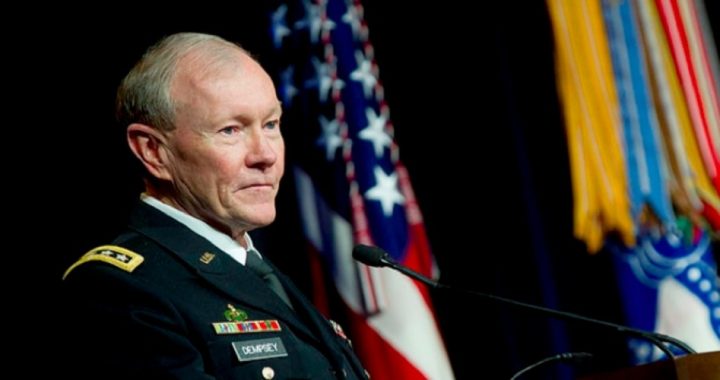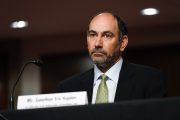
Chairman of the Joint Chiefs of Staff Army General Martin Dempsey said “a large ground force” might be needed to defeat ISIL (aka ISIS), the terrorist force that the United States and some of its allies have been targeting with air strikes in both Syria and Iraq. And Speaker of the House John Boehner (R-Ohio) said the United States will “have no choice” but to send American troops if allies in the region are unwilling to face up to the task.
“Our targeted actions are disrupting ISIL’s command and control and their logistics capabilities and their infrastructure in Syria,” Gen. Dempsey said while updating reporters Friday on the air war that began weeks ago in Iraq and was expanded into Syria during the past week. “While in Iraq,” he added, “we’re empowering our Iraq partners to go back on the offensive.” The general also pointed out that the campaign against the terrorist organization that has captured large sections of Iraq and occupies parts of Syria is not just military, but also involves obstructing the organization’s financing, interdicting foreign fighters and exposing “ISIL’s false narrative,” by “stripping away their cloak of religious legitimacy behind which they hide.”
Asked about his recent testimony to the Senate Committee on Foreign Relations, in which he said he might at some point recommend the introduction of U.S. ground troops despite President Obama’s oft-repeated pledge that American ground forces would not be sent back to the region, Dempsey again stressed his willingness to make such a recommendation if the present strategy fails to defeat the terrorists.
“If you’re asking me would I would provide my best military advice at all times, the answer is absolutely,” Dempsey said. “If you’re suggesting that I might, at some point, recommend that we need a large ground force to counter ISIL, the answer to that is also absolutely.”
But Dempsey said the ground force would not have to be American if the United States and its coalition partners succeed in aiding Iraq and Kurdish forces to engage and defeat ISIL in Iraq and in arming and training “moderates” among the Syrian rebels to take on ISIL in that country. How long it will take to defeat the terrorists in both countries depends in part on the ability of “the new government of Iraq to convince the Sunni, Shia, and Kurds that their future should rest with them, not with separations along sectarian lines,” Dempsey said.
According to Dempsey, success in Syria will require arming and training a large segment of the Syrian opposition. “We’ve had estimates anywhere from 12,000 to 15,000 is what we believe they would need to recapture lost territory in eastern Syria,” the chairman said. “I am confident that we can establish their training if we do it right.”
The United States has sent military assistance teams to Saudi Arabia to train initially 5,000 Syrian rebels. How long it will take to adequately train and deploy them against the Islamic State fighters is among the unknowns in America’s latest Middle East war.
“We have to do it right, not fast,” Dempsey said. “They have to have military leaders that bind them together. They have to have a political structure into which they can hook, and therefore be responsive to. And that’s going to take some time.” It also remains to be seen what effect the reintroduction of U.S. military personnel in Saudi Arabia will have on radical Islamists in the region. Osama bin Laden, the late leader of al-Qaeda, claimed after 9/11 that the attacks on the United States were motivated in part by the presence of U.S. and other “infidel” boots on Saudi soil, which many Muslims regard as sacred ground.
Boehner, while campaigning in New England for Republican House candidates over the weekend, told ABC’s George Stephanopoulos that the United States might “have no choice” but to send U.S. ground troops into the battle, despite the president’s pledge.
“If the goal is to destroy ISIS, as the president says it is, I don’t believe the strategy that he outlined will accomplish that,” Boehner said. “At the end of the day, I think it’s gonna take more than air strikes to drive them outta there.” The speaker added that if he were president, “I probably wouldn’t have talked about what I wouldn’t do. And maybe we can get enough of these forces trained to get ’em on the battlefield. But somebody’s boots have to be there.”
“And if no one else will step up,” Stephanopoulos asked, “would you recommend putting American boots on the ground?
“We have no choice,” Boehner answered. “These are barbarians. They intend to kill us. And if we don’t destroy them first, we’re gonna pay the price.”
Asked if the Congress should vote on authorizing military action against ISIL, Boehner said he would call the House, now on fall break, back into session for such a vote if the president requested it.
“The president typically in a situation like this would call for an authorization vote and go sell that to the American people and send a resolution to the Hill,” Boehner said, “The president has not done that. He believes he has authority under existing resolutions to do what he’s done.”
“You don’t agree?” Stephanopoulos asked.
“I think he does have the authority to do it. But the point I’ve been making is that this is a proposal that the Congress ought to consider.”
White House spokesmen have claimed that existing authority for the military action the president has taken may be found in the Authorization for the Use of Military Force passed by Congress in the fall of 2001 and another AUMF passed a year later to authorize the 2003 invasion of Iraq. The 2001 resolution, however, authorized action against those responsible for the 9/11 attacks and any who aided or harbored them, while the authorization for the Iraq War was aimed at what was then “the current Iraqi regime” of Saddam Hussein, which was overthrown by the invading forces. Ironically, Obama called for the repeal of the 2001 authorization in an address at the National Defense University in Washington in May of last year. The speech followed a series of successful battles against al-Qaeda forces and came two years after a team of U.S. Navy SEALs found and killed bin Laden.
“The AUMF is now nearly 12 years old,” the president observed. “The Afghan war is coming to an end. Core al Qaeda is a shell of its former self…. Unless we discipline our thinking, our definitions, our actions, we may be drawn into more wars we don’t need to fight, or continue to grant presidents unbound powers more suited for traditional armed conflicts between nation states.”
Even in “traditional armed conflicts,” the powers of the president are not “unbound,” though presidents are often conceded more leeway in unconstitutionally stretching the boundaries of their authority during wartime than when the nation is at peace. Contrary to what Boehner told Stephanopoulos, the authority to decide when and if to go to war belongs to Congress not the president — it is not a case of a president who has already entered into a war asking Congress to “consider” ratifying his decision if he so chooses.
Article I, Section 8 of the Constitution of the United States explicitly gives to Congress the power “to declare war.” Article II states the president shall be commander-in-chief of the armed forces. In No. 69 of The Federalist Papers, Alexander Hamilton, the Founder best known for favoring a generous grant of power to the chief executive, nonetheless was quite clear on the limitations of the power the new Constitution delegated to the commander in chief:
The President is to be commander-in-chief of the army and navy of the United States. In this respect his authority would be nominally the same with that of the king of Great Britain, but in substance much inferior to it. It would amount to nothing more than the supreme command and direction of the military and naval forces, as first General and admiral of the Confederacy; while that of the British king extends to the DECLARING of war and to the RAISING and REGULATING of fleets and armies, all which, by the Constitution under consideration, would appertain to the legislature. [Emphasis in original.]
“America is at a crossroads,” Obama said in his speech at National Defense University. “We must define the nature and scope of this struggle, or else it will define us. We have to be mindful of James Madison’s warning that ‘No nation could preserve its freedom in the midst of continual warfare.'”
He might at this juncture be mindful of another of Madison’s wise observations: “The power to declare war, including the power of judging the causes of war, is fully and exclusively vested in the legislature.”



